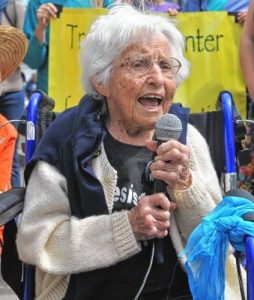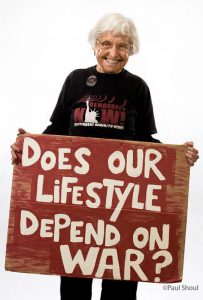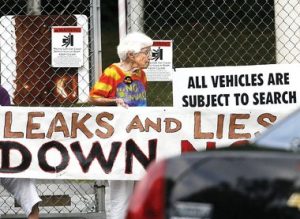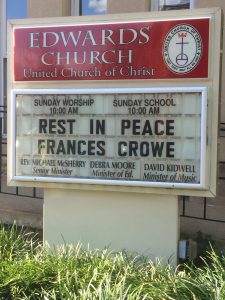100 Years of love, persistence, resistance…Frances Crowe, Presente! (March 15, 1919 – August 27, 2019) With gratitude for her life, which has been an example and an inspiration to so many of us near and far, for her activism for a peaceful and nuclear-free future, and so much more. Rest in power – all of us who you have protested with, supported, mentored and encouraged will carry on!
The bombing of Hiroshima led her to devote her life to antiwar protests. She was arrested often, but when asked how often, she said, “Not enough.”
by
In 1945, when she was at home in New Orleans ironing a place mat, Frances Crowe was alarmed to hear on the radio that in its efforts to end World War II, the United States had dropped an atomic bomb on the Japanese city of Hiroshima. The bomb instantly vaporized tens of thousands of people and ultimately killed as many as 135,000.
She immediately unplugged her iron and went looking for a gathering spot or peace center, to find like-minded people with whom she could share her distress. Unsuccessful, she went into a used-book store, where she searched for material on nonviolence. The bookstore owner suggested Tolstoy.
“So I started reading a collection of Tolstoy’s essays on war and violence,” she recalled years later, “and, you know, that kind of set my direction.”
She was 26 at the time. For the next three-quarters of a century, she would dedicate herself to trying to make the world a more peaceful place.
Ms. Crowe died on Tuesday at her home in Northampton, Mass. She was 100.
Her daughter, Caltha Crowe, said Ms. Crowe was exhausted and had taken to her bed several days ago, a highly unusual development for this energetic centenarian. She said her mother said, “This body is no longer livable” and “This is what it feels like to die.”
For decades, Ms. Crowe was a fixture in the peace movement and in multiple causes for social justice that swirled around Northampton, the college town where she raised her family.
Ms. Crowe was an instinctive pacifist for almost all her life. Her professional activism began in 1968, when she started counseling young men facing the draft during the Vietnam War about becoming conscientious objectors. Fifty years later, she was arrested for protesting the expansion of a natural gas pipeline through a state forest in western Massachusetts. She was 98 and in a wheelchair.
Soon to turn 100, she said: ‘I don’t want a party. I want an action that will accomplish something.’
“Somebody just told me that at my age, the way to be happy was to play cards all day, and I said, ‘Hogwash!’” she said in an interview for this obituary in November.
“People my age can afford to take risks, to be arrested,” she added. “After you’ve raised your family, now is the time for us, the elders, to act.”
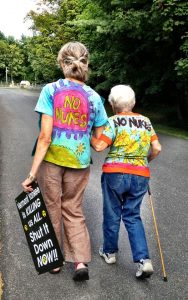 A tiny, sprightly woman with a thick mop of white hair, a pleasant smile and a polite manner that belied her determination, Ms. Crowe was arrested so often that she lost track.
A tiny, sprightly woman with a thick mop of white hair, a pleasant smile and a polite manner that belied her determination, Ms. Crowe was arrested so often that she lost track.
“Not enough,” she said when asked how many times she had been booked. “But probably around 100.”
She said she had been jailed in every state in New England, usually on charges of trespassing or civil disobedience. Her chief cause was protesting nuclear energy and nuclear weapons, which she said was her priority given their power to wipe out life on Earth.
In 1984, she spent a month in federal prison after painting “Thou Shalt Not Kill” on the casings of missile tubes at a nuclear submarine base in Rhode Island; she was released at the urging of the Rev. Jesse Jackson, who was running for president and hoping to find favor with white liberal New Englanders.
Working in the pre-internet era, she did much of her organizing by the seat of her pants. During the Vietnam War, when she was counseling draft-age men, she would mimeograph fliers with information and then go out and pick up students who were hitchhiking among the colleges in the region.
“I drove back between Northampton and Amherst, spent the day talking to my passengers, saying, ‘Well, what are you going to do about the draft?’ and passing my fliers back from my front seat,” she said in a 2008 oral history interview archived at Smith College. “I drove slow and talked fast.”
She eventually counseled roughly 2,000 young men.
Her list of causes kept growing. She embraced actions against apartheid in South Africa and against the B-1 bomber. She made financial contributions to a cancer clinic in Iraq. She fought for a sustainable environment and rigorously sought to reduce her carbon footprint — eating locally grown food, avoiding buying items that were overly packaged and leaving her car in the driveway, except to take bottles to the recycling center.
In her later years she wrote a memoir, “Finding My Radical Soul” (2014), and protested the nation’s war efforts by refusing to pay federal income taxes. She put her house and other assets in a trust. The government then docked 15 percent of her Social Security check each month.
She gave a third of her tax savings to international peace organizations, a third to American peace organizations and a third to the Northampton public schools.
As she looked forward to her 100th birthday, she told The Times: “I don’t want a party. I want an action that will accomplish something.”
On the day she turned 100 — March 15, 2019 — hundreds of well-wishers swarmed into downtown Northampton. She led a celebratory march in her wheelchair; marchers carried signs supporting the Green New Deal and calling for an end to gun violence and war.
“I see so many young people,” she said, “which gives me great hope.”
Frances Hyde was born in Carthage, Mo. She was one of four daughters of Chauncey William Hyde, who owned a plumbing and heating business and later a flower shop, and Anna (Heidlage) Hyde, a homemaker.
One of her earliest memories was when the town handed out tickets for the best views of the public hanging of a black man. She blurted out to her father that she opposed killing, adding for good measure that she also opposed war. “You wouldn’t say that if you had lived through World War I,” her father admonished.
But she was a natural skeptic, with little use for authority.
“I think that I was kind of born a rebel,” Ms. Crowe said in the oral history interview. She said her older sister always obeyed their parents, and “I decided that I had to do things differently if I were going to be noticed.”
She had grown up an observant Roman Catholic, but by the time she got to college — graduating from Stephens College, a two-year school, in 1939, and then from Syracuse University two years later — she was questioning the faith.
“It seemed to me the church was very hypocritical, that they were opposed to violence and killing but they were sanctioning war,” she said. She also thought women should be priests.
One day, she said, “I just literally walked out of a Mass and never went back.”
She met Thomas J. Crowe at Syracuse, where they both were wrestling with their faith. They married in 1945, and he died in 1997. In addition to her daughter, she is survived by her two sons, Jarlath and Dr. Thomas Hyde Crowe; five grandchildren; and two great-grandchildren.
During World War II, she worked in the personnel department of Bell Labs in Manhattan. Her future husband, who had earned his medical degree and was training to be a radiologist, joined the Army. At one point he was stationed in the Panama Canal Zone, so she moved to New Orleans to facilitate their visits. They were married there.
“I supported World War II,” she told The Times. “It was Hiroshima and the bombing of Dresden that helped me reach the decision that war was not the answer.”
Their son Jarlath was born deaf, and the family moved to Massachusetts in the early 1950s so he could attend the Clarke School for the Deaf in Northampton.
Ms. Crowe, who was a homemaker at that point, became active in the Women’s International League for Peace and Freedom and in SANE, the antinuclear group, holding meetings in her basement. She began her draft counseling and became involved with the American Friends Service Committee, making contact with and providing a bed for progressive speakers who came through town.
She regularly attended Quaker meetings.
Ms. Crowe relied on the rudimentary tools at her disposal to reach people and rouse them to action. This included erecting a radio tower in her backyard to broadcast the progressive global news program “Democracy Now!” before it was widely available over the airwaves.
“I’ve never broken a law that I felt better about,” Ms. Crowe told Amy Goodman, the program’s co-host, in 2005 of her act of piracy. “It gave me a large charge every day.”
At 99, Ms. Crowe attributed her longevity in part to Ms. Goodman. She told The Times, “I get my day started with Amy Goodman, who sets my gyroscope.”
She credited other factors too: “Good genes, growing up in a healthy environment — there was not much pollution in Missouri — eating vegetarian, having a husband who was a physician. And I have a passion for justice. That’s what carries me.”
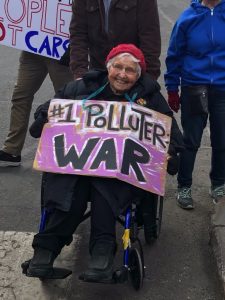 from Truthdig
from TruthdigGreta Thunberg, a 16-year-old Swedish climate activist, sailed into New York Harbor Wednesday after an occasionally harrowing, two-week trans-Atlantic voyage. Greta walks the walk, living her life with as small a carbon footprint as she can. She decided to forgo flying as part of that commitment, so, in order to make it from Europe to North America, she sailed on a zero-emissions racing yacht. The day before Greta’s arrival, on Tuesday, another activist ended a remarkable voyage. Frances Crowe, a lifelong peace activist, died at home in Western Massachusetts, surrounded by her family, at the age of 100. Frances was a firebrand, a nonviolent warrior for justice, arrested countless times protesting war, nuclear weapons, nuclear power plants and more. The departure of one elder activist on the eve of the arrival of one so young symbolizes, bittersweetly, the passing of a torch.
Frances was born just months after World War I ended. “My mother told me she took me to my first march when the soldiers came home,” she wrote in “Finding My Radical Soul,” her memoir. “I was only a baby, but I have always had the feeling that war has defined my life.” Her husband, Tom, was a medical doctor. Speaking on the “Democracy Now!” news hour in 2005, she described a pivotal moment in her life, Aug. 6, 1945, the day the United States dropped an atomic bomb on Hiroshima:
“I was a bride. My husband was in the Medical Corps in the Army. He had told me a few weeks before that he had heard rumors that we were developing this incredible weapon. He was at sea when we dropped the bomb, but I was alone in our apartment in New Orleans. When I heard it on the radio, I unplugged the iron, left the place mat that I was ironing and went out looking for a peace center in the streets of New Orleans.”
From that day, at the age of 26, until she died, Frances Crowe never relented in her pursuit of peace and justice. She was a war tax resister, refusing to pay taxes to support the sprawling Pentagon budget. She opposed South African apartheid and U.S. intervention in Central America in the 1980s and in Iraq and Afghanistan in the 2000s. She climbed fences into the Seneca Army Depot, and was arrested for pouring her own blood on a newly built Trident nuclear submarine just before it was launched in Connecticut.
Wednesday, at Manhattan’s North Cove Marina, a vessel of a different kind arrived. Hundreds of young climate activists cheered as Greta disembarked, standing on terra firma for the first time in two weeks. “The ground is still shaking for me,” she said as she opened her press conference.
“The climate is an ecological crisis, a global crisis, the biggest crisis humanity has ever faced,” she said. “If we don’t manage to cooperate, to work together despite our differences, then we will fail. … Let’s not wait any longer. Let’s do it now.”
We first met Greta at the U.N. climate change summit in Katowice, Poland, last December. She explained then on “Democracy Now!” that, because of her Asperger’s, “I work a bit different. I see things in black and white. I guess I saw the world from a different perspective.” She focused intently on the worsening climate crisis, even suffering debilitating depression around the age of 11. “I got out of that depression by promising myself that I’m going to do everything I can to change things,” she said Wednesday.
That determination led her to launch a school strike for the climate, skipping school every Friday to stand in front of the Swedish parliament, demanding action to prevent catastrophic climate change. Her protest spread, quickly going global. Hundreds of thousands of schoolchildren around the globe have participated in their own, local school strikes for the climate. This Friday, Greta will join kids in New York at their monthly strike outside the United Nations. A global strike for the climate, expected to be one of the largest global protests in history, will take place on Sept. 20. After that, Greta will make her way, using “a lot of trains, buses and probably even sailing,” she explained, to the next U.N. climate change summit in Santiago, Chile, in December.
Greta’s work as an activist is just beginning. She is a living example of what Frances Crowe said not long ago: “There is something else also to life, the joy of struggle, that not enough people have tasted. The joy of community, and the joy of cooperation, instead of competition; these are the values that I want to perpetuate and talk about to young people.”
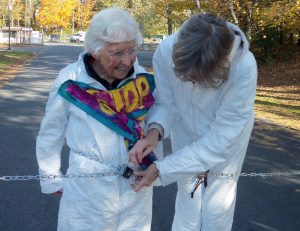 Editorial: In death, as in life, Frances Crowe will continue to inspire
Editorial: In death, as in life, Frances Crowe will continue to inspire
Published: 8/28/2019 Daily Hampshire Gazette Editorial
When longtime activist Frances Crowe was born in 1919, women still didn’t have the right to vote. One hundred years later, as we bid her farewell from this earth, much has changed, and we all owe her a debt of gratitude for fighting for the activist causes of peace, the environment, equality and a nuclear-free world.In May, the Gazette named Crowe, a resident of Northampton since 1951, its Person of the Year in recognition of her serving as an inspiration to so many in the activist and advocacy communities. But Crowe remained humble. “It isn’t that I’m different from anybody else,” she told the Gazette. “I’ve just been at it longer.”
Still, anyone who knew Frances Crowe could tell you there was something special about her. While full of kindness and trust for her fellow people — reporters seeking her out at times found her door unlocked and open — her inner determination to make change got her results.
Speaking to Gazette reporter Dusty Christensen Tuesday about her death, friend and fellow activist Claudia Lefko said one of Crowe’s proudest achievements was getting the radio program “Democracy Now!” with host Amy Goodman on the air in the Valley. Goodman herself told Christensen, “(She) just would not take no for an answer, and it just so deeply inspired us.”
In addition to her strong fights against wars in Vietnam, Iraq, Syria and other places, Crowe’s anti-nuclear stance propelled her into activism. The United States’ decision to drop two nuclear bombs on Hiroshima and Nagasaki solidified her opposition to World War II. Working for a nuclear-free world was a cause she fought for until the very end of her life.
In her final column for Hampshire Life magazine, Crowe highlighted an episode that describes her commitment to the anti-nuclear cause. In order to mock the common practice of smashing champagne bottles to launch new ships, she brought a baby bottled filled with her own blood to dump on a newly commissioned nuclear submarine in Connecticut in the 1980s. With help from some fellow Northampton activists, she managed to get in position and poured her blood on the sub. She described how the crowd surrounded her, scratched her face and arms, tore at her clothes and pulled her hair before police arrested her.
“It was all worth it,” she wrote. “We have to stop making nuclear weapons of all kinds.”
For Crowe, getting arrested was a sacrifice she was willing to make if it advanced a cause she believed in, something she proved again and again through acts such as chaining herself to the Vermont Yankee nuclear power plant. Following years of anti-nuclear activism, much involving Crowe, the plant shut down in 2014.
Once asked how many times she had been arrested by friend and activist Lois Ahrens, she replied, “not enough.”
Crowe’s death at the age of 100 leaves a hole in the Valley’s robust activist network and compounds the loss of Springfield activist and Arise for Social Justice founder Michaelann Bewsee, who died earlier this month at the age of 71 from complications of lung cancer.
And yet, while serving as an inspiration to so many, Crowe said that she was inspired by members of the youth activism community, including Swedish climate change activist Greta Thunberg, students in the Pioneer Valley and her own grandchildren. So long an elder stateswoman of progressive causes, she has long seen that the movements she was involved with didn’t start or end with any one person.
On so many causes she cared about, Crowe effectively passed the torch to others. NuclearBan.US, a nonprofit organization that started in Crowe’s living room, is continuing the fight against nuclear weapons under executive director Timmon Wallis. Jo Comerford, now a state senator, called Crowe one of her earliest inspirations when Comerford moved to the Valley in 1998. Activists around the world name Crowe among those who inspire them.
As we all reflect on the long, meaningful life of Frances Crowe, we can take heart that her work served as an inspiration to so many and has led to meaningful change. But it would be a mistake to think of her work as having come to an end. We expect that she will continue to inspire and move people to action for years to come.
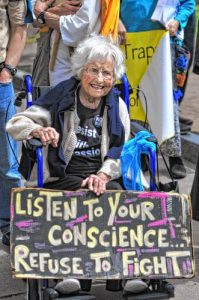 Frances Crowe, peace activist for the ages, dies at 100
Frances Crowe, peace activist for the ages, dies at 100
Frances Crowe once recalled that her activism began in the late 1920s, as a fifth-grader in Carthage, Mo., when she and her classmates in a peace friendship club sent letters to people around the world.
“We took ourselves very seriously,” she told the Globe in 1984, “all these little kids going to make peace.”
For nine more decades, Ms. Crowe never let up, notching more civil disobedience arrests at protests than she could count, and adding other causes to her original efforts.
She was 100 when she died Tuesday in her Northampton home, her family announced.
“Frances was a strong believer that one sets an example through the way one lives one’s life,” her family members said in an obituary they placed in the Daily Hampshire Gazette.
In an activism resume that could go on for pages, she participated in sit-ins at the construction site when the nuclear power plant was being built in Seabrook, N.H., and prayed for peace on the White House lawn.
She threw a vial of her own blood at a nuclear sub launch (“for my grandson’s future,” she noted) and spent a month in prison after breaking into a Rhode Island base to spray paint “Thou shalt not kill” on submarine tubes that would hold missiles.
Testifying on behalf of a fellow Seabrook protester in 1977, she told a jury that she, too, had demonstrated at the site because “my conscience told me I must put my body where my words have been.”
Two years ago, at 98, she was among several people who were arrested in Western Massachusetts while protesting the extension of a natural gas pipeline through a state forest. At the time, she parked her wheelchair in a restricted area.
“She has this very clear morality about what is right and wrong,” Jeff Napolitano, executive director of the Resistance Center for Peace and Justice in Northampton, told the Daily Hampshire Gazette this past spring when the newspaper named her person of the year.
“When has she been on the wrong side of history? She has a record,” Napolitano added. “If Frances is on your side, then you know that you probably are on the moral high ground.”
Though Ms. Crowe started down the road to activism as a young girl, the events of 1945 brought her politics into sharp focus.
“I was a 26-year-old American married to an aspiring radiologist,” she wrote in a recollection published in the Valley Advocate last month. “I listened to the radio as I ironed our clothes and learned that my country, the United States, had destroyed Hiroshima, Japan, by dropping an atomic bomb on it.”
Ms. Crowe would go on to counsel young men to become conscientious objectors during the Vietnam War and protest often at nuclear power plants, including Vermont Yankee in Vernon.
In her early 60s, she was still scaling fences, including at the Seneca Army Depot in upstate New York, where she demonstrated against missile deployment. Her physical feat drew cheers.
“Someone said, ‘Even the old lady is coming over,’ ” she recalled with a smile in the 1984 Globe interview. “One gets a lot of mileage out of white hair.”
By 2011, in her early 90s, she was deciding whether or not to bring a cane to a protest at Vermont Yankee and opted to travel light.
“I just need to take my ID for when we’re arrested,” she said in a conversation recorded for Robbie Leppzer’s documentary “Power Struggle.”
Born in Carthage, Mo., on March 15, 1919, Frances Hyde was a daughter of William Chauncey Hyde, who ran a plumbing and heating business.
“My mother, Anna Heidlage Hyde, made our clothes,” Ms. Crowe wrote in the Daily Hampshire Gazette, just before turning 100 in March.
Catholics in Carthage, such as her family, were targeted by the Ku Klux Klan, Ms. Crowe told the Globe in 1984, recalling that she had been struck with stones on the way to school in second grade.
In 1939, she graduated from Stephens College, a women’s college in Missouri. She also graduated two years later from Syracuse University, where she met Thomas J. Crowe, who became a physician. They married in 1945.
She told the Globe that during World War II, she had worked on an assembly line as part of the effort to help defeat the Nazis in Europe.
In the years following the war, Ms. Crowe and her husband had three children. Because one son was born deaf, the Crowes moved to Massachusetts so he could attend what was then Clarke School for the Deaf, in Northampton.
Once there, Ms. Crowe became a mainstay of activist groups, helping found a chapter of the Women’s International League for Peace and Freedom. In her basement she set up a peace center office that was filled with literature and posters. Along with her draft counseling work, she was active with the American Friends Service Committee.
She often said her proudest moment was when she installed a large antenna behind her home to broadcast the radio program “Democracy Now!” when she was initially unable to persuade local public radio stations and college stations to do so.
From the early 1970s onward, arrests at civil disobedience protests became a regular part of her life.
“There comes a time when to put your body there is more powerful than all the organizing you can do,” she said in 1984.
In later years, she had a ready answer for reporters who always asked how many times she had been arrested: “Not enough.”
Ms. Crowe, whose husband died in 1997, leaves a daughter, Caltha Crowe; two sons, Jarlath Crowe and Dr. Thomas H. Crowe; five grandchildren; and two great-grandchildren.
Plans for a memorial service were not immediately available.
In Western Massachusetts, Ms. Crowe was such a well-known activist that the mere mention of her name drew applause, as was the case at Hampshire College’s graduation in 1987, when a crowd cheered a speaker who praised her, Nelson Mandela, and Marian Wright Edelman.
Smith College, which houses Ms. Crowe’s papers in the Sophia Smith Collection, awarded her an honorary degree.
Her wishes, however, were for something more lasting.
“I hope that the United States and its citizens find the moral insight and courage to stop war of all kinds, end the exploitation of other countries and our own citizens, begin to stop climate disruption by eating local and driving less, end the use of nuclear weapons and nuclear power and foster fair and equitable employment for all workers,” she wrote for the Daily Hampshire Gazette just before turning 100. “What a happy birthday it would be if all my wishes came true.”
To pursue such goals, she always encouraged everyone to join her and raise their voices in protest.
“People my age have been lulled into the idea that they shouldn’t take risks, that they should stay comfortable and take the easy way,” she told the Globe in 2010. “But we’ve lived our lives, and we have nothing to lose — no kids or jobs to worry about. I say to them, ‘Have some fun. Get out there and join the community of people acting on their beliefs!’ ”
xxx
